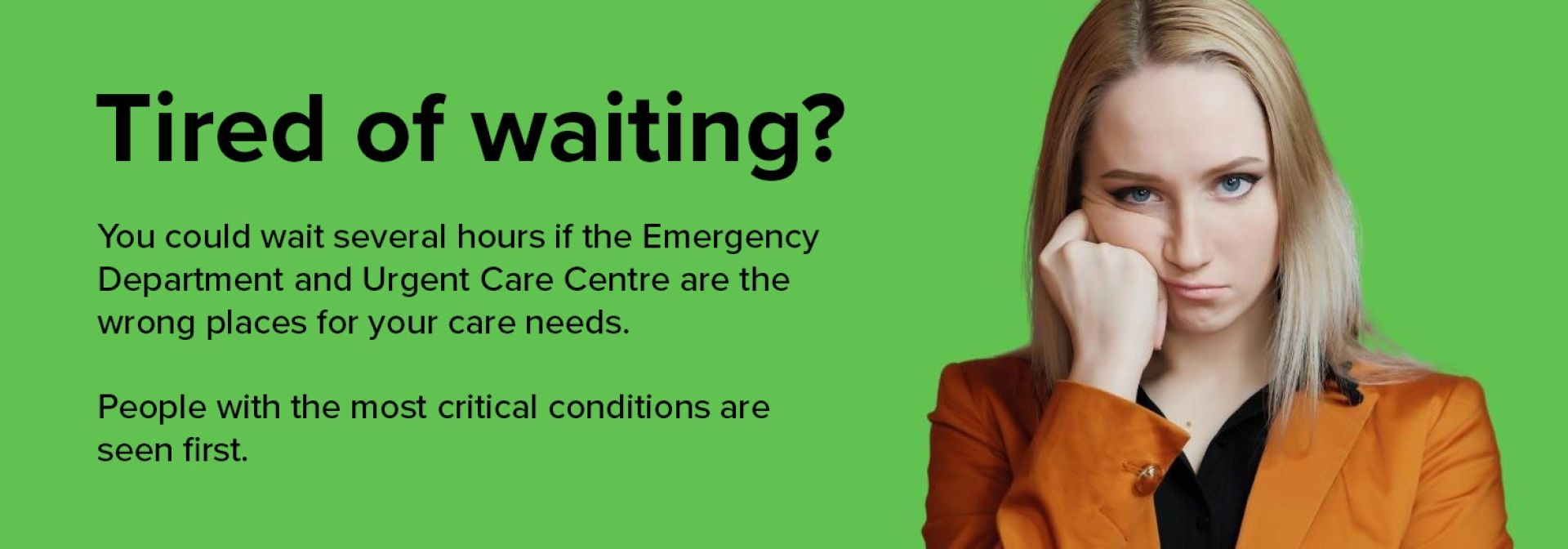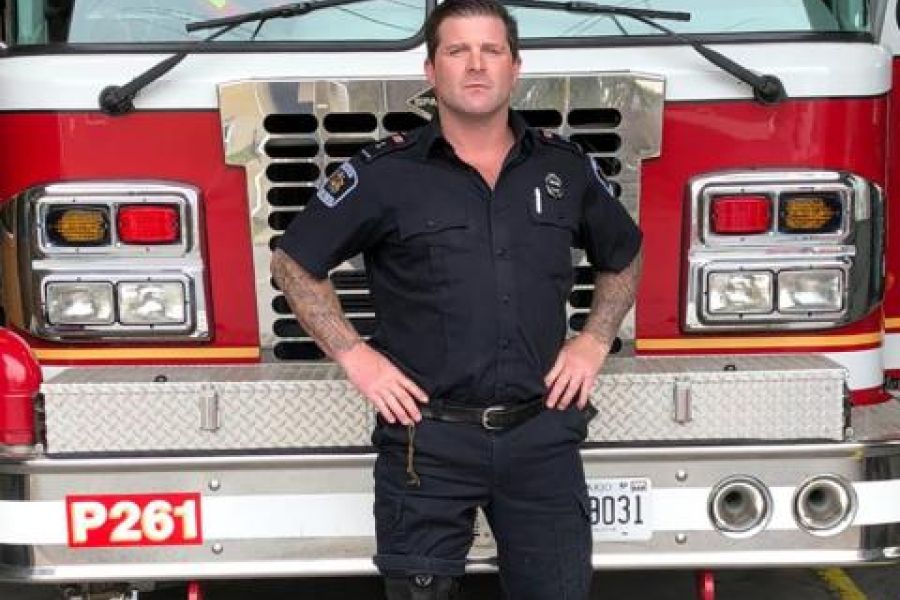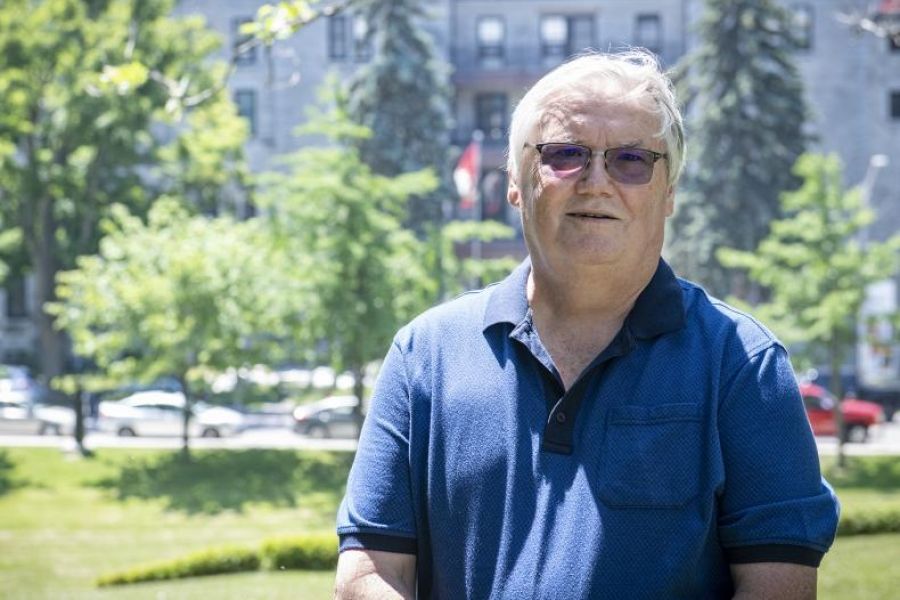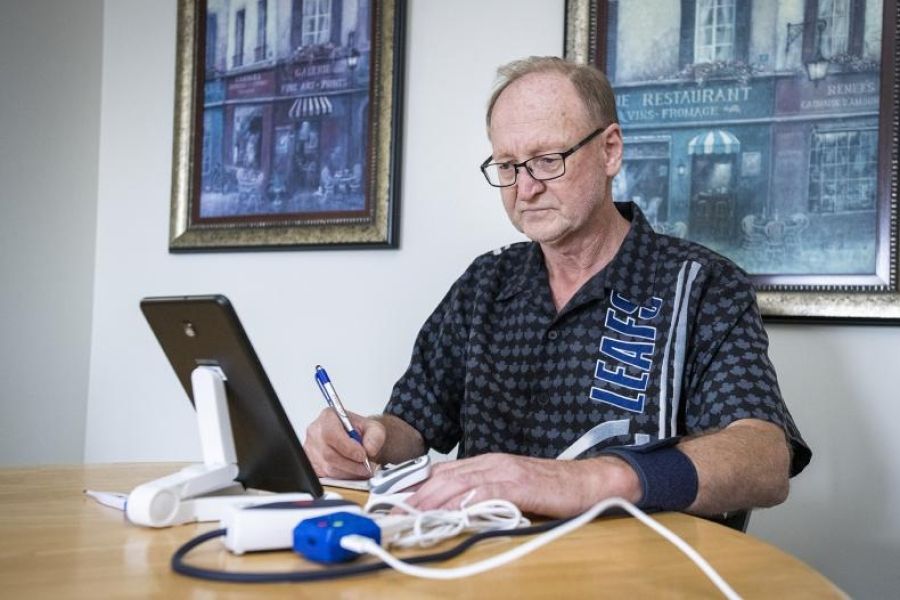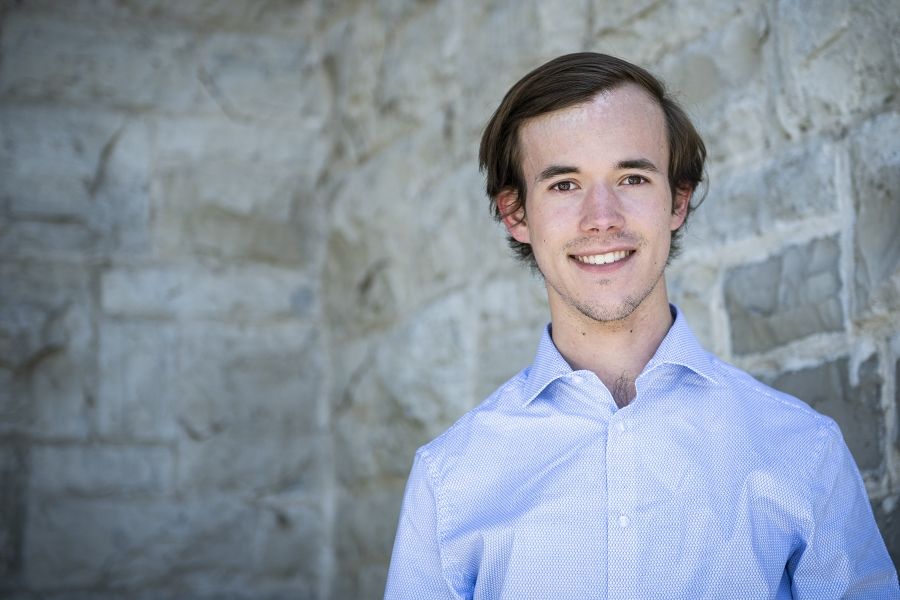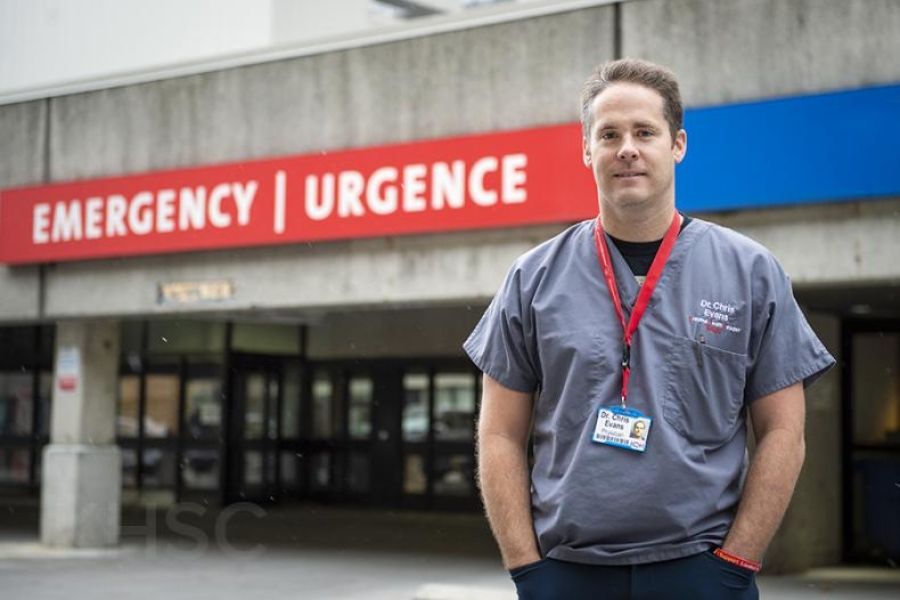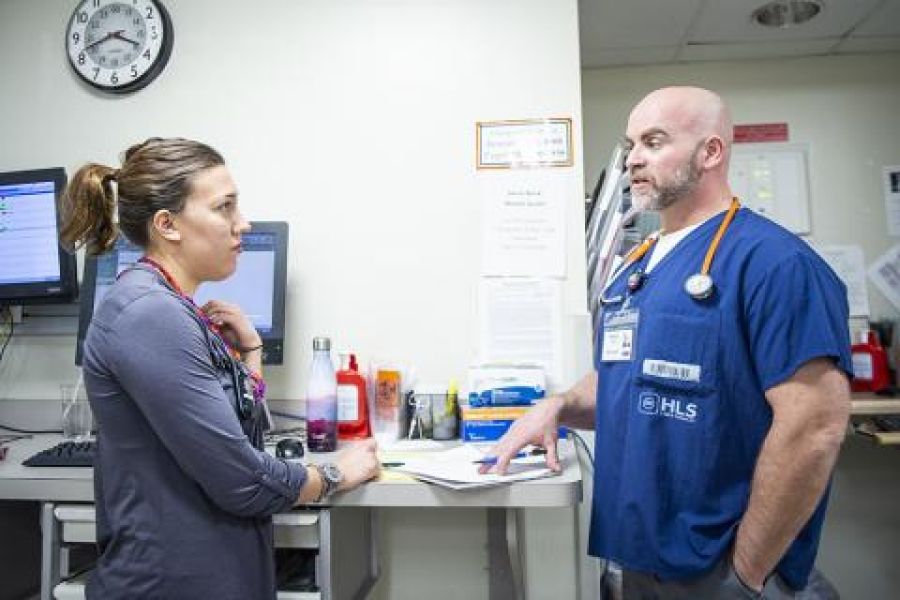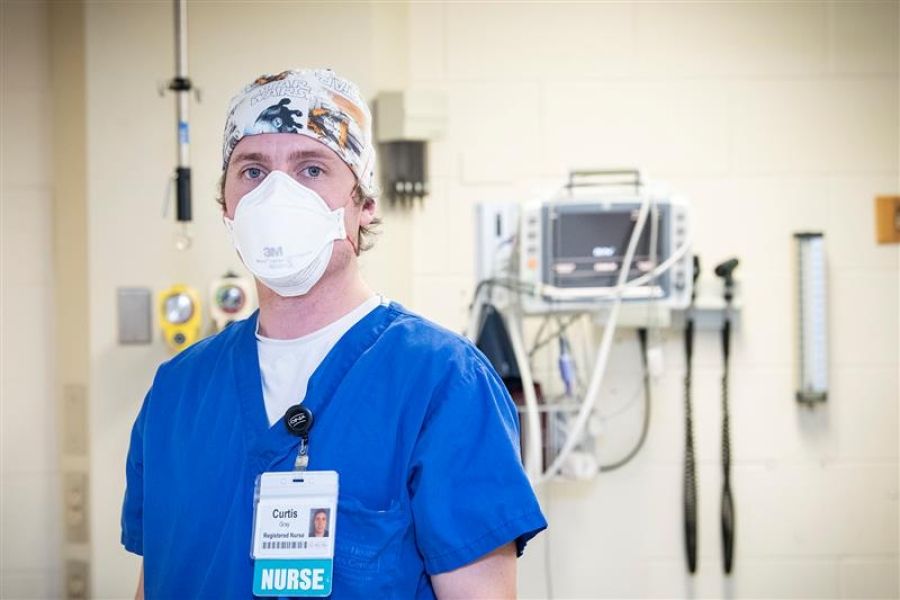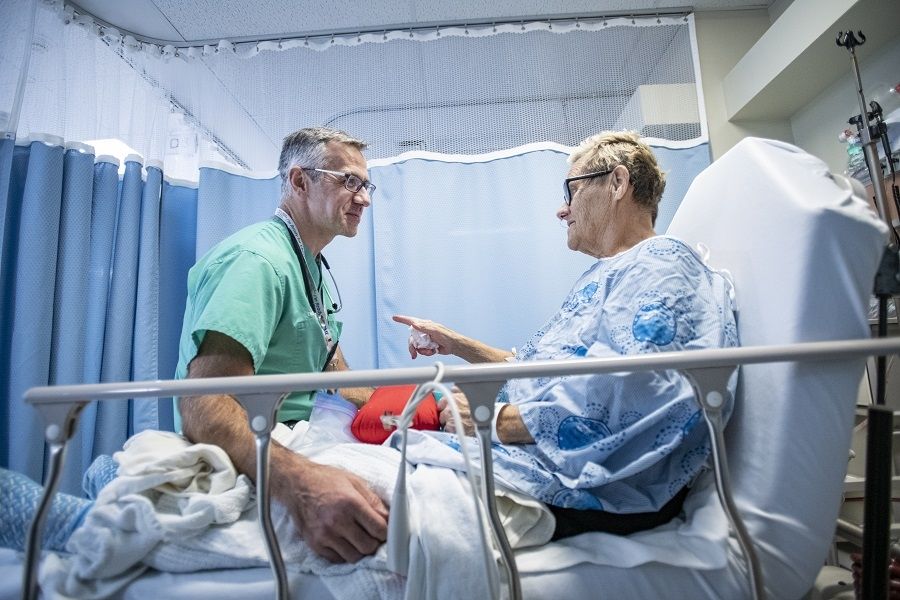Right Place, Right Care
Choose the Right Place for the Right Care
Choosing the right place for the right care can positively impact your health, improve the work experiences of care teams, and allow the overall health system to function at its best. At the bottom of this page, we encourage you to read about some of the people working in the specialty of Urgent and Emergency Care and a few of the patients who have benefited from their skills.
There are many different health services available in our community to help you. The list below provides recommendations on going to the right place for the right care.
For a health concern call your family doctor first
If your family doctor is not available
For medication for a common health concern
If you don't have a family doctor and want one
For an urgent medication refill
For community and social services
If you need preventative health care
For an urgent health concern that needs to be addressed within 24 hours
For critical or life-threatening conditions that need immediate attention
We understand that sometimes Urgent and Emergency Care settings are your last resort, and we will be here for you, but whenever possible, please seek care at the right place from the right health-care provider.
For a non-life-threatening health concern call your family doctor first
- Your family doctor knows your medical history best. Same-day urgent appointments may be available.
- Your family doctor may be a member of one of the following Family Health Teams, giving you access to an on-call doctor who provides urgent, but non-life-threatening care without an appointment after hours and on weekends: Kingston Family Health Team, Maple Family Health Team and Queen's Family Health Team.
- If you’re looking for cancer screening services, such as screening for breast, colorectal, cervical or lung cancer, visit Cancer Care Ontario.
If your family doctor is not available or you don't have a family doctor
- Check the hours of operation and visit a medical clinic, such as CDK, Greater Napanee Health Home Access Clinic, and Good Doctors. Same-day care may be available.
- Visit a virtual care clinic at the East Region Virtual Care Clinic, Gotodoctor.ca, Maple, Cover Heath (OHIP-covered), RocketDoctor.ca, TiaHealth.com, Telus Health MyCare, or MD Connected (access may be limited and fees may apply)
- Queen's University students can call 613.533.2506 to attend the Student Wellness Services same-day clinic
- St. Lawrence College students can call 613.544.5400, ext. 5521 or email @email to attend the Kingston Campus Health Centre
For medication for a common health concern that can be reliably self-diagnosed and managed with self-care strategies and/or minimal treatment
-
Pharmacists can now offer prescriptions for the following: hay fever (allergic rhinitis), oral thrush (candidal stomatitis), pink eye (conjunctivitis: bacterial, allergic and viral), dermatitis (atopic, eczema, allergic and contact), menstrual cramps (dysmenorrhea), acid reflux (gastroesophageal reflux disease (GERD)), hemorrhoids, cold sores (herpes labialis), impetigo, insect bites and hives, tick bites (post-exposure prophylaxis to prevent Lyme disease), sprains and strains (musculoskeletal), urinary tract infections, acne, canker sores, yeast infections, nausea and vomiting related to pregnancy, diaper rash, and parasitic worms such as pinworms and threadworms.
-
Before visiting a pharmacy, contact the pharmacist to confirm they provide prescribing services for certain common ailments.
-
You may also contact your pharmacist for minor issues that might be managed with over-the-counter medications.
If you don't have a family doctor and want one
It’s important to your overall, long-term health to have a family doctor. Invest in your health. People who have family doctors are generally healthier. Here are two options to find a family doctor or nurse practitioner who is accepting new patients:
- Register to get connected with a primary-care provider by visiting Health Care Connect online at Ontario.ca/healthcareconnect or by calling 1-800-445-1822.
- Use The College of Physicians and Surgeons of Ontario’s Find a Doctor search.
- Choose “Advanced Search” to find a doctor near you (by city/town or postal code)
- Click on “Additional Search Options” to narrow your search (to family doctors and/or language spoken)
- Contact the doctor to check if they are accepting new patients
For an urgent medication refill
- Call your family doctor.
- Your pharmacist may be able to provide an emergency refill of your prescription, including medications for chronic conditions.
For a mental health concern
- Call a Crisis Line available 24/7, 365 days a year. For Kingston and Frontenac call 613.544.4229 or 1-866-616-6005 (toll-free). For Lennox and Addington call 613.354.7388 or 1-800-267-7877 (toll-free). Children and youth can call the Kids Help Phone at 1-800-668-6868 or text 'Connect' to 686868.
- Walk-in crisis services are available from Addiction and Mental Health Services - KFLA, with no need to book an appointment, in Kingston and Napanee, Monday to Friday, 8:30 a.m. to 3:30 p.m. The Maltby Centre also provides walk-in services for children and youth.
- Visit AccessMHA.ca to be paired with a trained professional who will connect you to mental health and addiction services.
- If you or someone you know is thinking about suicide, call or text 9-8-8. Support is available 24 hours a day, seven days a week.
- If you are not experiencing a crisis, call your family doctor.
- See below for when to call 9-1-1.
For community and social services
- Call 2-1-1 or visit 211ontario.ca
- This helpline is available 24/7 to connect you to information and support for a wide range of community, social, health and government services in 150+ languages.
- Resources related to food, housing, employment, financial assistance, caregiver support, family services and more.
If you can't see your family doctor and you need preventative care
- Call 613-548-9400 ext. 429, visit FrontenacParamedics.ca or ask your doctor about the Frontenac Paramedics' Community Paramedicine program. The program offers home visits to vulnerable residents and preventative health clinics for common conditions such as high blood pressure, diabetes, COPD and risk of falls, reducing demand for urgent or emergency care.
- The Midtown Kingston Health Home offers the community a variety of health tests, clinics and screenings.
For an urgent health concern that needs to be addressed within 24 hours
- When you are unable to get a same-day appointment with a family doctor and your concern needs to be addressed within 24 hours, such as minor broken bones and burns, and cuts needing stitches, check the hours of operation and go to the nearest urgent care centre (UCC).
- Kingston Health Sciences Centre's (KHSC) UCC is located at its Hotel Dieu Hospital (HDH) site at 144 Brock Street in Kingston.
- The Children's Outpatient Urgent Care Clinic is also located at the HDH site at 166 Brock Street on Jeanne Mance 1.
For critical or life-threatening conditions that need immediate attention
- Call 9-1-1 or go to the nearest emergency department (ED).
- If a person could die or be permanently disabled, it is an emergency.
- In Kingston, the ED is located at KHSC's Kingston General Hospital site at 41 King Street West.
- Emergency departments are not the place to go for minor illnesses or injuries. Please use your ED wisely.

